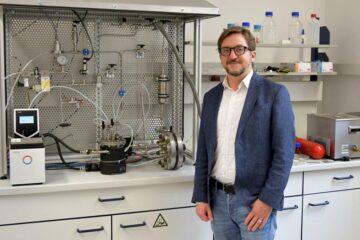Winners of Global Energy International Prize 2004 announced in Moscow

The International Award Committee has awarded the Global Energy International Prize – 2004 to the following scientists:
Fyodor Mitenkov
– Academician of the Russian Academy of Sciences, and research manager of the State Unitary Enterprise “Engineering Experimental Development Bureau named after A.A. Africantov” (Russia) and
Leonard J. Koch
– Professor, and Retired Vice President of Illinois Power Company (USA)
«FOR THE DEVELOPMENT OF APPLIED PHYSICS FUNDAMENTALS AND CREATION OF POWER REACTORS ON FAST NEUTRONS»
Alexander Sheindlin
– Academician of the Russian Academy of Sciences, and Honorary director of the RAS Associated Institute of High Temperatures (Russia)
«FOR FUNDAMENTAL INVESTIGATIONS OF THERMOPHYSICAL PROPERTIES OF MATTER AT THE LIMIT TEMPERATURES FOR POWER ENGINEERING»
The 2004 Global Energy International Prize, worth USD $900,000, will be equally shared among the three prize winners.
The technology developed by Fyodor Mitenkov and Leonard Koch allows for the creation of a safer nuclear energy for human society. The development of power reactors on fast neutrons, marked by the Global Energy International Prize, is one of most important discoveries in the sphere of nuclear energy. Reactors of this type create the possibility to generate energy in an extended cycle, in other words to reproduce energy while in the process of work.
Àlexander Sheidlin has created a scientific basis for modern heat energy which provides 90% of the total energy at present time. Pioneer explorations of water and water vapor thermodynamic properties, representing the basis for establishing power stations of the new generation with critical characteristics, belong to professor Sheindlin. Many of the world scientists have performed research in the direction mentioned contemporaneously with Àlexander Sheidlin. Anyway, it was he who managed to achieve the sought after results. The outcome of his works have been included in all the fundamental domestic and foreign reference-books.
At the same time Àlexander Sheidlin has expanded the exploration works to the study of thermophysical properties of metals and their vapors (natrium, potassium, caesium, rubidium, liquid uranium). Many of these properties have been discovered for the first time in world history. The outcomes have found the widest application in nuclear power plants and direct power generating plants.
A chairman of the International Award Committee, Zhores Alferov, said that this years winners are brilliant scientists and individuals, and outstanding physicists, who have conducted research in the field of thermal physics, heat-and-power engineering and nuclear mechanical engineering for many years.
400 specialists from all over the world, including 240 foreign and 160 Russian scientists have the right to nominate candidates for the 2004 Prize. More than 60 works were nominated, all of them complying with the concept of “global power engineering”. More than a third of these works belong to non-Russian scientists.
The final session of the International Award Committee examined five research works, put forward by the Commission of Experts. There were several criteria areas assessed: science value, practical relevance, originality, and importance not only for the Russian energy sector but the whole world.
The second Global Energy International Prize will be awarded in St.Petersburg at the end of June, 2004. President Vladimir Putin is expected to present the award to the three winners.
The winners were announced on April 26, 2004 at the special international press-conference held in video-conferencing format in three cities: Moscow, St. Petersburg and Rome. This video-conferencing was provided by the official telecommunicational partner of the Prize – COMSTAR
Media Contact
Alle Nachrichten aus der Kategorie: Förderungen Preise
Neueste Beiträge

Ideen für die Zukunft
TU Berlin präsentiert sich vom 22. bis 26. April 2024 mit neun Projekten auf der Hannover Messe 2024. Die HANNOVER MESSE gilt als die Weltleitmesse der Industrie. Ihr diesjähriger Schwerpunkt…

Peptide auf interstellarem Eis
Dass einfache Peptide auf kosmischen Staubkörnern entstehen können, wurde vom Forschungsteam um Dr. Serge Krasnokutski vom Astrophysikalischen Labor des Max-Planck-Instituts für Astronomie an der Universität Jena bereits gezeigt. Bisher ging…

Wasserstoff-Produktion in der heimischen Garage
Forschungsteam der Frankfurt UAS entwickelt Prototyp für Privathaushalte: Förderzusage vom Land Hessen für 2. Projektphase. Wasserstoff als Energieträger der Zukunft ist nicht frei verfügbar, sondern muss aufwendig hergestellt werden. Das…





















